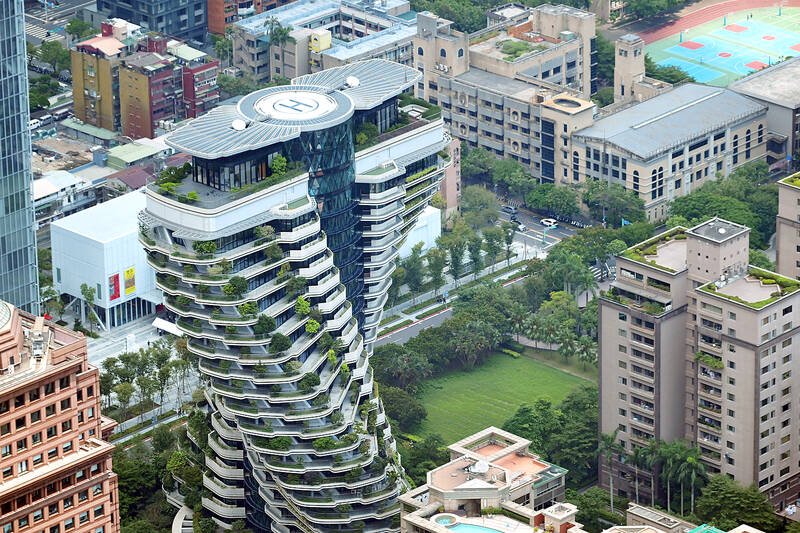Residential properties in the Tao Zhu Yin Yuan (陶朱隱園), a distinctive double-helix tower in Taipei’s Xinyi District (信義), officially went on sale yesterday.
The announcement was made by the tower’s builder, BES Engineering Corp (中華工程), which declined to publicize pricing information to protect the privacy of potential buyers.
However, real-estate sources said that properties on the lower floors would sell for at least NT$3 million (US$91,609) per ping (3.3m2), with higher prices on the building’s upper floors.

Photo: Hu Shun-hsiang, Taipei Times
Given that each unit is about 300 ping, properties in the tower would likely start at about NT$900 million.
Designed by Belgian architect Vincent Callebaut, the Tao Zhu Yin Yuan is inspired by the double-helix structure of DNA, with each floor from levels 2 to 21 rotating 4.5° clockwise, or a total of 90°.
As a result, each of the tower’s 40 units has a large terrace with an unimpeded view of the sky and allows for the planting of seven large trees, the building’s Web site says.
Each unit also features a 50-ping “sky garden” where residents can plant a garden, while the building’s public areas include a “forest” on the first floor with a 10m waterfall and a 25m swimming pool in the basement, the site says.
Chen Ping-chen (陳炳辰), spokesman for the Chinese-language My Housing Monthly (住展雜誌), said the tower’s NT$3 million per ping price tag likely represented “the ceiling” for luxury properties in Taipei.
According to the government’s actual price registration system, the highest-priced residential complex in Taipei is One Park Taipei (元利信義聯勤), twin skyscrapers on the east end of Daan Forest Park (大安森林公園), which previously sold for as high as NT$2.99 million per ping, Chen said.
Nevertheless, the Tao Zhu Yin Yuan’s home prices represent a “correction” from the past few years — when they were reportedly expected to go for as high as NT$6 million per ping — possibly due to the central bank’s efforts to clamp down on housing speculation, he said.
Taiwan Realty Co (台灣房屋) senior manager Chen Ting-chung (陳定中) said that although construction on the property was completed eight years ago, the limited supply of new luxury homes in Xinyi District — a prime business district where Taipei 101 is located — meant that there would likely still be solid demand from buyers.

NEW IDENTITY: Known for its software, India has expanded into hardware, with its semiconductor industry growing from US$38bn in 2023 to US$45bn to US$50bn India on Saturday inaugurated its first semiconductor assembly and test facility, a milestone in the government’s push to reduce dependence on foreign chipmakers and stake a claim in a sector dominated by China. Indian Prime Minister Narendra Modi opened US firm Micron Technology Inc’s semiconductor assembly, test and packaging unit in his home state of Gujarat, hailing the “dawn of a new era” for India’s technology ambitions. “When young Indians look back in the future, they will see this decade as the turning point in our tech future,” Modi told the event, which was broadcast on his YouTube channel. The plant would convert

‘SEISMIC SHIFT’: The researcher forecast there would be about 1.1 billion mobile shipments this year, down from 1.26 billion the prior year and erasing years of gains The global smartphone market is expected to contract 12.9 percent this year due to the unprecedented memorychip shortage, marking “a crisis like no other,” researcher International Data Corp (IDC) said. The new forecast, a dramatic revision down from earlier estimates, gives the latest accounting of the ongoing memory crunch that is affecting every corner of the electronics industry. The demand for advanced memory to power artificial intelligence (AI) tasks has drained global supply until well into next year and jeopardizes the business model of many smartphone makers. IDC forecast about 1.1 billion mobile shipments this year, down from 1.26 billion the prior

People stand in a Pokemon store in Tokyo on Thursday. One of the world highest-grossing franchises is celebrated its 30th anniversary yesterday.

Zimbabwe’s ban on raw lithium exports is forcing Chinese miners to rethink their strategy, speeding up plans to process the metal locally instead of shipping it to China’s vast rechargeable battery industry. The country is Africa’s largest lithium producer and has one of the world’s largest reserves, according to the US Geological Survey (USGS). Zimbabwe already banned the export of lithium ore in 2022 and last year announced it would halt exports of lithium concentrates from January next year. However, on Wednesday it imposed the ban with immediate effect, leaving unclear what the lithium mining sector would do in the